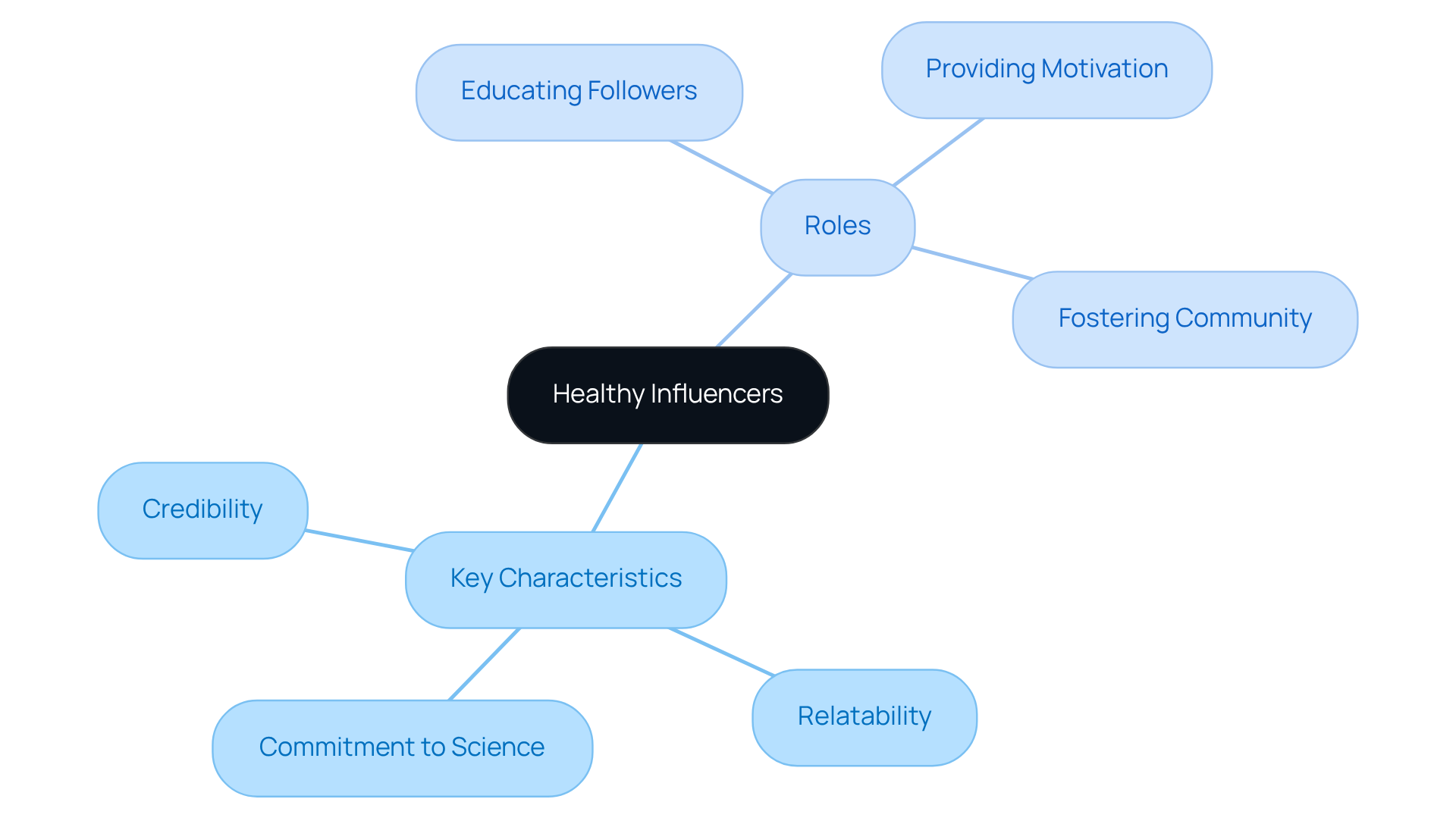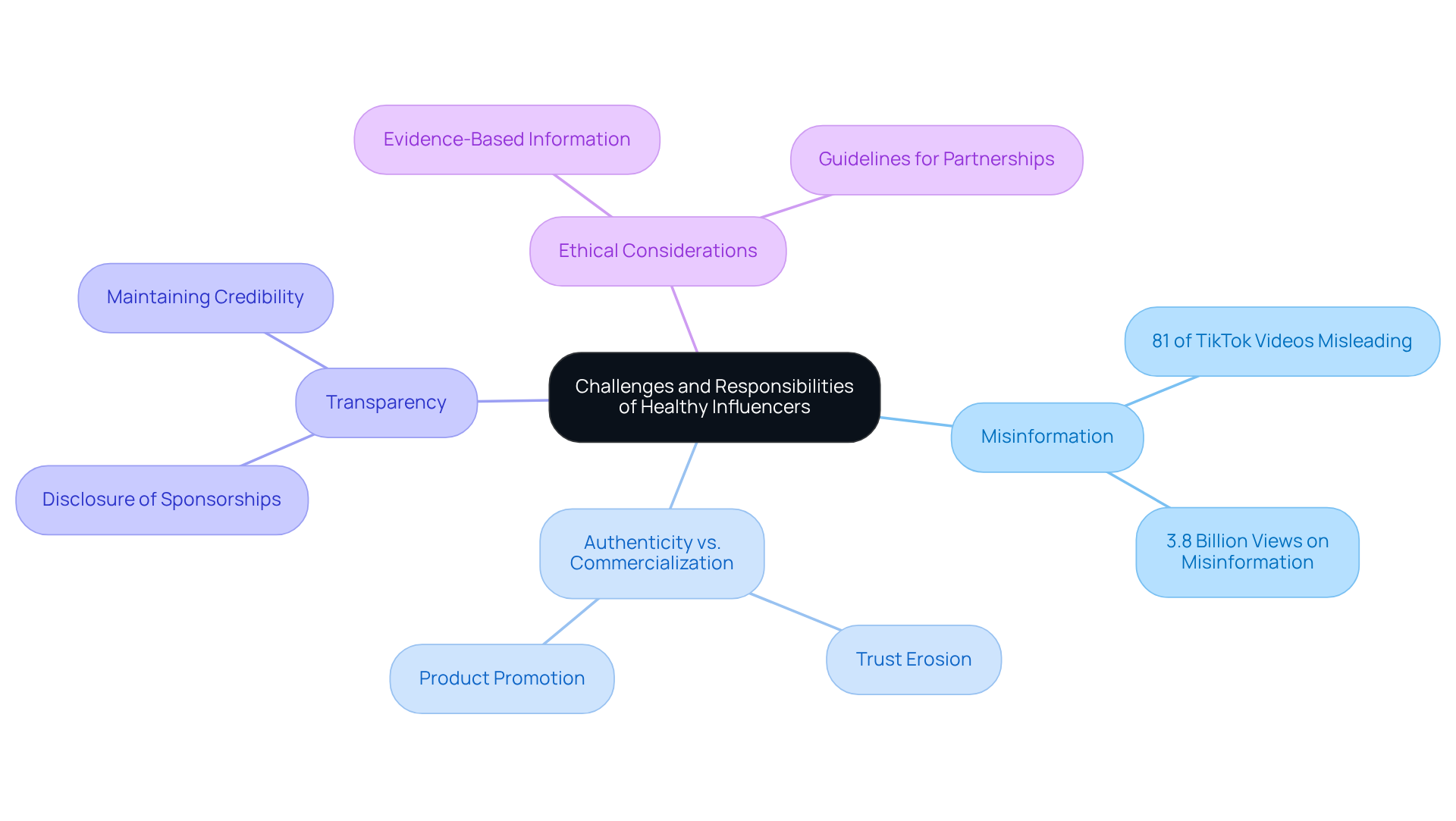
Introduction
The rise of healthy influencers signifies a pivotal transformation in the marketing landscape, underscoring an increasing public interest in wellness and fitness. These individuals harness their platforms not merely to endorse products but to cultivate healthier lifestyles and foster community engagement through credible, relatable content. However, as their influence grows, a critical question emerges: how can brands ensure they collaborate with authentic voices while navigating the complexities of misinformation and consumer trust?
Exploring the role of healthy influencers unveils their substantial impact on consumer behavior and the responsibilities they uphold in promoting wellness. This dynamic not only shapes marketing strategies but also reflects a broader societal shift towards prioritizing health and well-being. As brands seek to align with these influencers, understanding their potential and the ethical considerations involved becomes essential.
In this evolving landscape, brands must act decisively, ensuring partnerships that resonate with authenticity and integrity. The journey towards fostering genuine connections with consumers starts with recognizing the vital role healthy influencers play in shaping perceptions and behaviors around wellness.
Defining Healthy Influencers: Key Characteristics and Roles
Healthy individuals often become healthy influencers by actively leveraging their platforms to promote wellness, fitness, and healthy living. They possess knowledge in areas such as nutrition, fitness, and mental well-being, connecting with their audiences through authentic content that encourages healthier lifestyle choices. Key characteristics of a healthy influencer include:
- Credibility
- Relatability
- A steadfast commitment to sharing scientifically-backed information
Furthermore, healthy influencers often encompass:
- Educating their followers
- Providing motivation
- Fostering a sense of community around health-related topics
This makes them vital players in the marketing landscape. By engaging with their audiences, they not only inspire change but also create a ripple effect that promotes overall well-being.
In addition, consider how these role models can influence your own health journey. Are you following individuals who embody these qualities? Engaging with credible sources can significantly impact your approach to wellness and fitness.

The Rise of Healthy Influencers in Modern Marketing
The emergence of healthy influencers is a direct response to the growing public interest in health and fitness. This trend is fueled by the expansion of social media platforms and a shift in consumer trust away from traditional advertising. As audiences increasingly seek relatable and trustworthy sources of information, healthy influencers have emerged as credible voices in the wellness sector. Their ability to forge personal connections, especially on visually-driven platforms like Instagram and TikTok, allows them to be seen as healthy influencers who effectively promote healthy lifestyles and products.
Furthermore, this shift in consumer engagement has prompted companies to form genuine partnerships with healthy influencers. This strategy enables brands to connect more effectively with health-conscious individuals. Statistics reveal that a significant portion of social media users actively engage with healthy influencers, with younger generations demonstrating particularly high levels of interaction. This underscores the effectiveness of this marketing approach in driving consumer interest and behavior.
However, companies must navigate the regulatory landscape carefully, ensuring compliance with FTC guidelines to maintain transparency and trust. Non-compliance can lead to serious risks, including legal repercussions and damage to a company's reputation. As a result, brands are adapting their marketing strategies to leverage the influence of healthy influencers, ensuring their messaging resonates with the values and preferences of today's health-focused audiences.

Influencer Impact: Shaping Consumer Choices and Brand Loyalty
Healthy individuals play a pivotal role in shaping consumer choices by delivering relatable content that resonates deeply with their followers. Research indicates that consumers are significantly more likely to trust recommendations from personalities they admire rather than traditional advertisements. This trust translates directly into purchasing decisions, as followers often aspire to emulate the lifestyles of their favorite figures.
Furthermore, these healthy influencers cultivate brand loyalty by fostering a sense of community and belonging among their audience. Brands that partner with healthy influencers can leverage their credibility to enhance their own image and drive sales, as evidenced by successful campaigns across various sectors of fitness and wellbeing.

Types of Healthy Influencers: From Nutritionists to Fitness Coaches
Healthy influencers can be classified into various categories, each focusing on distinct elements of health.
- Nutritionists and dietitians act as healthy influencers by providing dietary advice and promoting healthy eating habits, often sharing recipes and meal plans that resonate with their audience.
- Fitness coaches serve as healthy influencers by emphasizing the importance of physical activity and offering workout routines and motivational content that inspire action.
- However, it’s crucial to recognize that some fitness advocates may inadvertently promote unrealistic body standards and misinformation, which can adversely affect their followers' well-being.
Healthy influencers play a vital role in promoting emotional well-being and mindfulness practices, highlighting the significance of mental health in overall wellness. Additionally, healthy influencers often blend elements from all these categories, presenting a holistic approach to health that appeals to a broader audience. This diversity enables companies to effectively reach specific demographics, aligning their marketing objectives with the right advocates.
Moreover, authenticity is paramount for a healthy influencer marketing strategy; studies show that 90% of consumers value authenticity when deciding which companies to support. By partnering with nutritionists and fitness coaches, brands can not only promote their products but also position themselves as a healthy influencer, as these individuals are often perceived as relatable and genuine sources of information. Campaigns featuring micro-influencers can yield an impressive return on investment (ROI) of approximately 20:1, making them particularly effective in engaging niche audiences.
As the health sector continues to expand, strategically employing a healthy influencer will be essential in influencing consumer preferences and promoting healthier lifestyles.

Challenges and Responsibilities of Healthy Influencers
Healthy influencers play a crucial role in promoting wellness, yet they face significant challenges and responsibilities. A primary concern is the potential spread of misinformation, as many influencers lack formal qualifications in wellness or nutrition. This gap can lead to a healthy influencer endorsing unverified or harmful practices, thereby misleading their audience. For instance, a February 2025 study revealed that 81% of TikTok videos claiming to cure cancer contained false or misleading information, highlighting the dangers associated with influencer-driven wellness narratives. Furthermore, global health misinformation networks amassed 3.8 billion views on Facebook during the pandemic, underscoring the scale of this issue.
Moreover, healthy influencers must strike a careful balance between authenticity and commercialization. Excessive promotion of products can alienate followers, eroding trust. Transparency in sponsorships is essential; influencers are expected to disclose their affiliations to maintain credibility. For a healthy influencer, ethical considerations, such as providing evidence-based information, are vital for fostering trust with their audience. Healthcare brands should establish internal ethical guidelines for influencer partnerships to ensure genuine trust and compliance with legal standards. In a context where 58% of individuals aged 18-34 regret well-being choices influenced by misinformation, healthy influencers must remain vigilant in promoting responsible practices and ensuring their content aligns with verified information. By doing so, they can positively impact public health while mitigating the risks associated with misinformation.

Conclusion
Healthy influencers are pivotal in today’s marketing landscape, championing wellness and healthy living through credible and relatable content. They inspire individuals to embrace healthier lifestyles and cultivate a community that prioritizes science-backed information, making them indispensable in our health-conscious society.
Key characteristics of healthy influencers include their credibility, relatability, and commitment to education. This rise is a direct response to changing consumer preferences, where audiences increasingly favor authentic sources over traditional advertising. Their influence is clear, shaping consumer choices and fostering brand loyalty, as followers often trust these influencers’ recommendations more than conventional marketing tactics.
Given the substantial impact healthy influencers wield, it’s essential for both individuals and brands to engage with this dynamic responsibly. By following credible influencers and partnering with them ethically, companies can enhance their marketing strategies while positively contributing to public health. As influencer marketing continues to evolve, embracing the role of healthy influencers will be crucial in promoting informed, healthier choices for consumers everywhere.
Frequently Asked Questions
What defines a healthy influencer?
A healthy influencer is someone who actively promotes wellness, fitness, and healthy living through their platforms. They possess knowledge in areas such as nutrition, fitness, and mental well-being, and connect with their audiences through authentic content that encourages healthier lifestyle choices.
What are the key characteristics of a healthy influencer?
Key characteristics of a healthy influencer include credibility, relatability, and a steadfast commitment to sharing scientifically-backed information.
What roles do healthy influencers play in their communities?
Healthy influencers educate their followers, provide motivation, and foster a sense of community around health-related topics, making them vital players in the marketing landscape.
How have healthy influencers risen in modern marketing?
The rise of healthy influencers is a response to the growing public interest in health and fitness, fueled by the expansion of social media and a shift in consumer trust away from traditional advertising.
Why do audiences prefer healthy influencers over traditional advertising?
Audiences seek relatable and trustworthy sources of information, and healthy influencers are seen as credible voices in the wellness sector due to their ability to forge personal connections, especially on platforms like Instagram and TikTok.
How do companies benefit from partnering with healthy influencers?
Companies form genuine partnerships with healthy influencers to connect more effectively with health-conscious individuals, leveraging the influencers' credibility to drive consumer interest and behavior.
What demographic shows high engagement with healthy influencers?
Younger generations demonstrate particularly high levels of interaction with healthy influencers on social media.
What regulatory considerations must companies keep in mind when working with healthy influencers?
Companies must navigate the regulatory landscape carefully, ensuring compliance with FTC guidelines to maintain transparency and trust, as non-compliance can lead to legal repercussions and damage to reputation.






